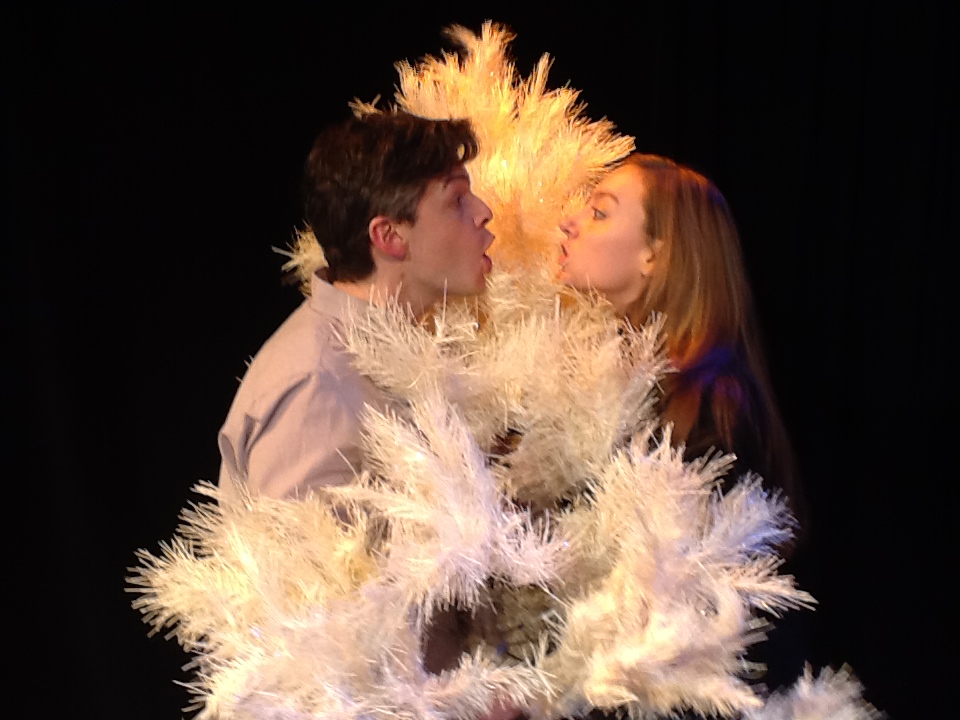by Christian Usera
PERFORMANCE NETWORK Theater has kicked off its holiday season with a bang with two shows: “Gift of the Magi” and “This Wonderful Life.” This reviewer saw the former and was greeted with festive Christmas Lights, bright yellow tope walls and a concession stand stocked with tasty, salty/sugary snacks.
The venue hall was warm and inviting with adequate seating. (The seats are a little tight and your humble correspondent isn’t a large man. But this is nitpicking.) The hustle and bustle of activity before the event was typical for opening night jitters.
The audience was older, but did have a smattering of younger theatre goers. A folksie version of “Rudolph the Red Nose Reindeer” played over the loud speaker followed by several other classics. (The Scrooge in me rolled his eyes, but the kid in me is nostalgic.)
But then the play began.
In the first scene we’re introduced to a woman played by Alysia Kolascz. She describes writing the play and a conversation with her daughter about the idea of a gift. The girl chides the mother that “(She’s) over thinking it. Gifts are just nice” and that’s all there is to it. With her simple logic, the little girl nails the very concept of the play. For the woman, gifts have to mean something. The actress then goes stage right and begins to describes what she believes makes a good gift, while the man, played by Barton Bund, goes stage left and pontificates on what he thinks makes an adequate token of affection.
(Hint: He’s thinking gift card; she’s thinking soulful artifact that will bring a tear to the receiver’s eyes.) By separating the venue, each actor is pulling in her/his respective sides into the play, which was a wonderful way of interacting with the audience in an indirect manner. It didn’t hinder the performance, but enhanced it. This device had me hooked.

The man is left on the stage after this banter subsides. He pulls out an old copy of “Gift of the Magi” by O Henry and recalls a passage from the end of the book, which involves the amount $1.87. This is what the character Della is able to save for her husband’s Christmas gift. The number becomes a theme for all the subsequent vignettes that span from the early 1900s to the present day. (There were five in total.)
The first of these skits was a traditional rendition of the O Henry classic without much deviation. A husband and wife attempt to scrounge enough money to buy each other gifts, but instead a comedy of errors ensues.
The best part of this bit was the interaction between “ghost” characters who weren’t there. This could have been a part of the play where the audience’s suspension of disbelief was shattered, but instead by talking directly to the crowd on opposing sides of the venue, Kolascz and Bund pulled it off.
The next vignette takes place in 1942 and is a romantic tale about two lovers penning letters to each other during World War II.
She describes going to church, family dinners and Christmas time. She wonders about the French food and dreams of being with him in France enjoying the food.
Meanwhile the soldier is eating alone looking at a picture of his sweetheart, when a French woman sees him pining and brings another dish of food and wine so he can eat with her in spirit. It was a tender moment.
Next comes a scene change and the audience is flung into the 1960s. A man is in his apartment when a woman knocks on the door. There is a series of comic riffs between them.
She is bringing him a Christmas tree and wishes to settle an old score. The two have a violent history that crosses between love and enmity. She decides to leave and wants to take her gift back. They fight over the tree only to break it, a symbol of their broken relationship.
The man is left alone.
After a fifteen minute intermission there’s a fast forward to the 1980s. Over the loud speaker the audience hears a list of flights that are canceled.
An anxiety-filled woman and a man, both waiting for a delayed flight to Detroit, sit on the same bench. They share books, food and anecdotes about their families, eventually becoming friends. They decide to give each other a gift, but in the tradition of O Henry, a comedy of errors occurs and both end up canceling each other out.
The last vignette was definitely the funniest. A newly wed couple, one Jewish (and agnostic) and the other a somewhat practicing Christian, get roped into performing a live nativity scene.
The husband brings the wife an elaborate gift, and the wife reveals she’s pregnant, driving the husband into hysterics, as he’s lost his job.
Exasperated, he snaps, “Jesus Christ!” (But realizing his mistake quickly adds) “…Is being born!” (This had to be the funniest part of the production.)
The play ends with Bund’s character delivering a cheesie spiel about the greatest gift being love. But then again, who can argue with that logic?
In the final analysis the performances by both Bund and Kolascz were solid. Each character had quirks and individual personalities, which ranged from neurotic, sweet and angry.
Each vignette had its own allure. The first skit was traditional, the second showcased the longing of separation, while the third dealt with the complexity of love and loss. The last two performances were about friendship and family.
However, all the vignettes had a unifying theme: love is the driving force behind giving and receiving. In a world dominated by consumerism during the holiday season, it’s refreshing to have a simple reminder of thoughtful human connection. “Gift of the Magi” hits all the right notes and draws the audience in with its clever version of Christmas magic.

